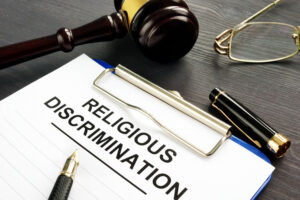 Blackwell Security Services, Inc. recently settled a religious discrimination lawsuit filed by the Equal Employment Opportunity Commission (EEOC).
Blackwell Security Services, Inc. recently settled a religious discrimination lawsuit filed by the Equal Employment Opportunity Commission (EEOC).
According to the EEOC’s lawsuit, the employee, a concierge in Chicago, Illinois, is a practicing Muslim who wore a beard in adherence with his religious beliefs. After he was hired, a Blackwell supervisor told the employee that company policy required all employees to be clean-shaven. His request for exemption for religious reasons was denied by Blackwell management. The employee reluctantly shaved his beard to maintain his job, later claiming that doing so caused him significant distress.
The EEOC found that Blackwell’s refusal to accommodate the employee’s religious practice violated Title VII of the Civil Rights Act of 1964, which among other things prohibits religious discrimination. Rather, Title VII requires employers to reasonably accommodate an employee’s religious observance unless doing so would impose undue hardship. The EEOC concluded that allowing the employee to wear his beard would have imposed no burden on anyone at the company. After first attempting to reach a pre-litigation settlement through its conciliation process, the EEOC filed suit on the employee’s behalf in U.S. District Court for the Northern District of Illinois (Civil Action No.1:23-cv-14110).
The parties later agreed to a consent decree resolving the lawsuit in which Blackwell will pay the former employee $70,000 in compensation. Additionally, Blackwell agreed to train management employees on the federal laws prohibiting religious discrimination and to report any additional complaints of religious discrimination to the EEOC for the length of the decree.
StraightforWARD Legal Advice:
Title VII requires employers to reasonably accommodate their employees’ religious beliefs and practices, unless doing so would impose an undue hardship on the employer’s business. For example, employers may need to modify dress codes to permit religious attire or insignia, such as headscarves, turbans, or other religious garments when these accommodations do not pose a safety risk or interfere with job performance. Work schedules may need adjustment to allow employees time off for religious holidays or worship. Accommodations like these aim to ensure that employees can work and practice their religious beliefs at the same time, without facing discrimination or undue hardship in the workplace. An employer’s failure to comply with the reasonable accommodation requirements may result in significant penalties, including being required to pay the employee’s litigation attorney fees.
Employers with questions about corporate compliance and employment litigation should contact attorney Mark Stephenson at mstephenson@thewardlaw.com or 215-647-6614.
